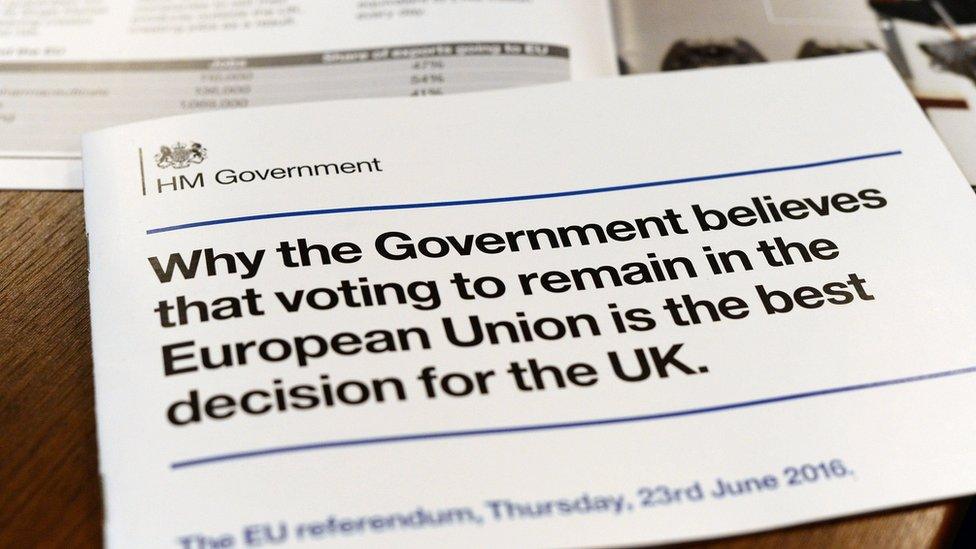EU referendum: NHS cash row as campaigns get under way
- Published
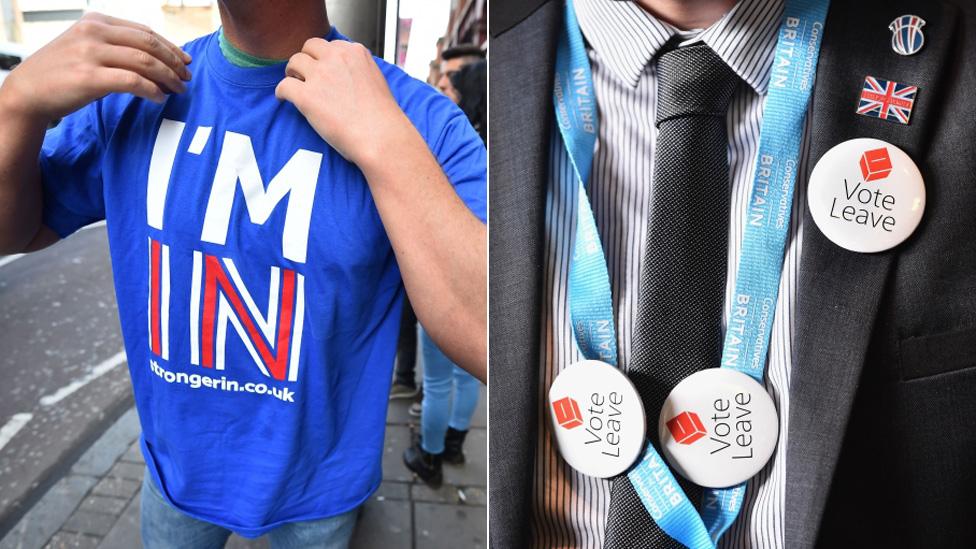
The designated lead campaigns can spend up to £7m
The EU referendum campaign has kicked off with a row over claims millions could be freed up for the NHS if Britain voted to leave on 23 June.
Vote Leave claims £50m a day is being sent to Brussels - money it says could be spent instead on building hospitals and reducing pressures on the NHS.
But Britain Stronger in Europe says that figure is wrong - and leaving the EU would harm the health service.
Opinion polls suggest the referendum is too close to call with 10 weeks to go.
In the main campaign developments so far:
Chancellor George Osborne says families will "pay the price" if the UK exits the EU and it is likely mortgage rates would go up
London Mayor Boris Johnson tells a Manchester rally leaving the EU would be a "glorious alternative" to the current system based on "the whims of unelected bureaucrats"
UKIP leader Nigel Farage has challenged David Cameron to a head-to-head debate over the government's £9m pro-EU leaflet
The head of the Catholic Church in England and Wales said the UK would face "more complex problems" outside the EU
A survey commissioned by ITV's Good Morning Britain suggested 40% of those asked wanted to stay in the EU while 39% wanted to leave
The NHS has emerged as the chief battleground on day one of the official campaign, with Leave campaigners calling for a large slice of the UK's net contribution to the EU's coffers - which it says amounts to £350m a week - to be pumped into the NHS instead.
Laura Kuenssberg: Leave campaign claims aimed at undecided voters
EU referendum: Alistair Darling denies 'Project Fear'
EU vote: Brexit to 'free up' NHS cash
"I think we ought to decide ourselves how we spend that money and I would suggest we spend it on the NHS," said Gisela Stuart, the Labour MP and co-chair of the cross-party Vote Leave group.
"The NHS is under tremendous pressure, people have to wait longer whether it is for treatment or for A&E and I think £350m would be better spent on the NHS."

Reality Check: Would Brexit mean extra £350m a week for NHS?

We've said it before and we'll say it again - the UK does not send £350m a week to Brussels - the rebate is deducted before the money is sent, which takes the contribution down to £276m a week.
That figure includes £88m a week spent in the UK on things like regional aid and support for farmers. The government could decide after a Brexit that it should take that money away from farmers and give it instead to the NHS, but it might be an unpopular decision in rural areas.

Her message is being echoed by Conservative heavyweights, such as Mr Johnson and Justice Secretary Michael Gove, key figures in the Leave movement.
"At the moment the money we give to the European Union is spent by others, people we have never elected and never chosen and can't remove," Mr Gove said.
"If that money is taken back, that £50m a day will be spent on British people's priorities and the NHS is top of people's list."
'Project Fantasy'
Britain Stronger in Europe - the main Remain campaign - has said the £350m figure is inaccurate because the UK gets a large chunk of its membership fee back through the UK's annual rebate, money which is already spent in a number of areas, including on farming subsidies.
Mr Osborne was speaking to BBC economics editor Kamal Ahmed in Washington DC
Its executive director Will Straw described Vote Leave's arguments as "unedifying speculation" and claimed several of its supporters wanted to privatise the NHS.
And the TUC said the NHS, which costs £2.25bn a week to run and is reliant on migrant labour, would face a staffing crisis if the UK was to vote to leave the EU.
The BBC's political correspondent Iain Watson said there was likely to be a lot of trading of statistics during the campaign, with some opinions stated as facts.
Addressing the broader economic case for remaining in the UK, Lord Darling, who was Labour chancellor from 2007 to 2010, warned against choosing "isolation rather than influence".
In a speech in London, the Labour peer - who led the successful Better Together campaign in the Scottish independence referendum - argued the referendum was "not about sovereignty" because the UK "is a sovereign nation and will remain so".

EU referendum: In depth
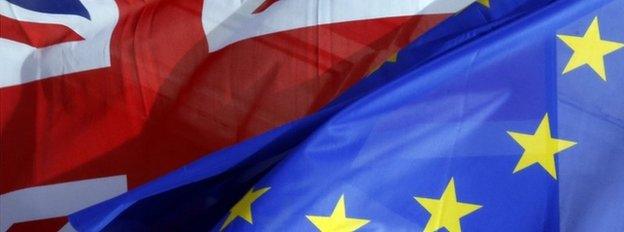

The Labour peer rejected claims that the Remain campaign was using the same tactics as Better Together did in 2014 - dubbed "Project Fear" by its opponents - saying he made "no apology" for exposing his opponents' "fear of the spotlight of legitimate scrutiny".
"It is not Project Fear. In truth, it is a reality check. The kind anyone would rightly take before making an enormous decision affecting their lives."
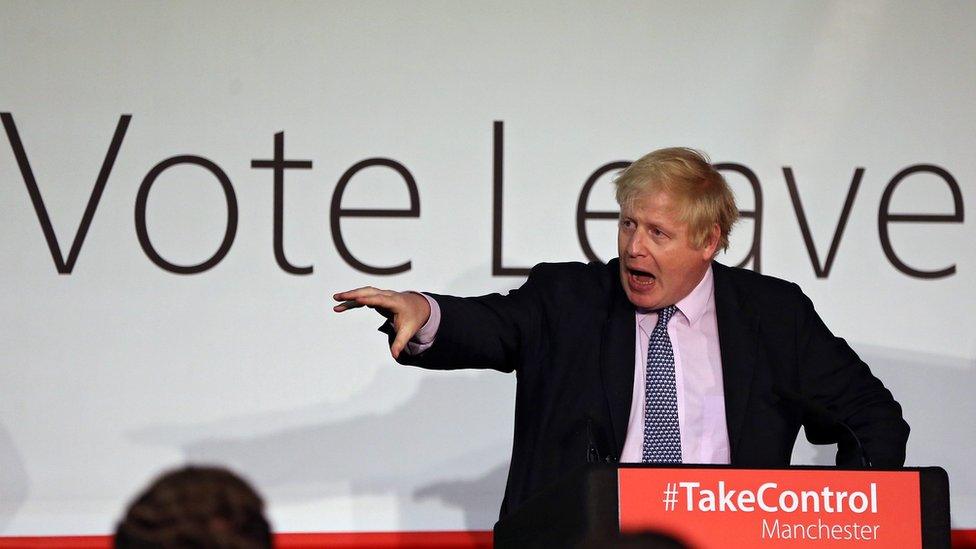
London Mayor Boris Johnson addressed a crowd in Manchester, telling them there was a "glorious alternative" for Britain outside the EU
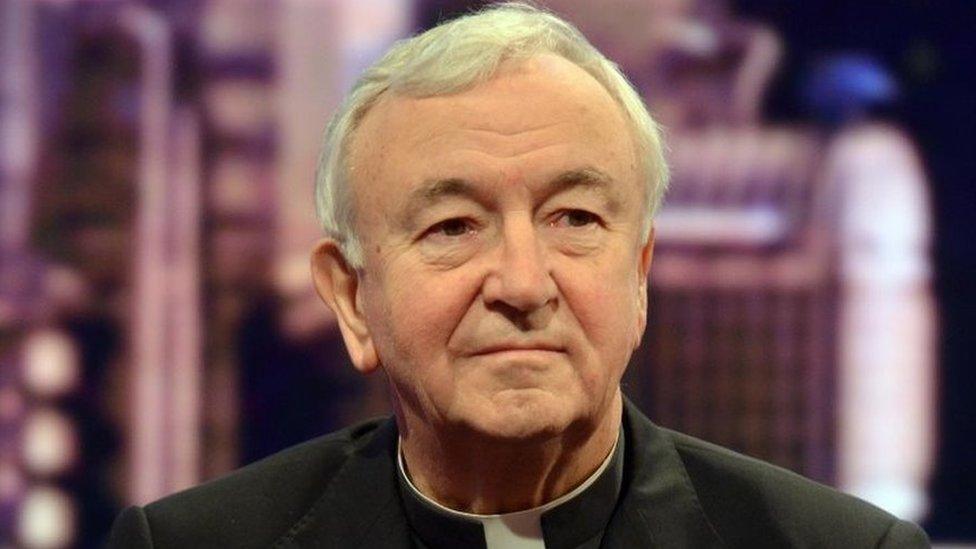
Cardinal Vincent Nichols said European solidarity had helped bring peace to the continent
Speaking in Washington, ahead of a visit by US President Barack Obama to the UK next week, George Osborne said it was the "overwhelming view" of foreign governments and international institutions such as IMF and Nato that the UK should remain.
Asked whether he agreed with the Remain campaign's claim that mortgage rates would go up in the event of EU exit, Mr Osborne said this was a matter for the Bank of England but it was a widely held view that "prices would rise, jobs would be lost and living standards would fall".
But Vote Leave chief executive Matthew Elliott said: "Less than 24 hours in and the pro-EU camp are already panicking - resorting to doing down the economy and people's mortgages to intimidate the British public into voting their way."
At a Brexit rally in Manchester, Boris Johnson said one of the most "depressing things about the campaign to Bremain" is that "there is not a shred of idealism" - but Labour accused him of "talking down Britain's influence".
"The EU, they say - it's crap but we have no alternative," Mr Johnson said.
"Well we do have an alternative, and it is a glorious alternative, a relationship with Europe based not on the whims of unelected bureaucrats but on cooperation between elected governments."
UKIP leader Nigel Farage has, meanwhile, challenged David Cameron to a face-to-face debate as he delivered a letter to Downing Street protesting at the government's pro-EU £9m leaflet campaign.
Mr Farage, who took on former Lib Dem leader Nick Clegg during the 2014 European elections, said the government's arguments were "jammed full of lies and inaccuracies" and the prime minister must front up to "see if your claims will stand up to public scrutiny".
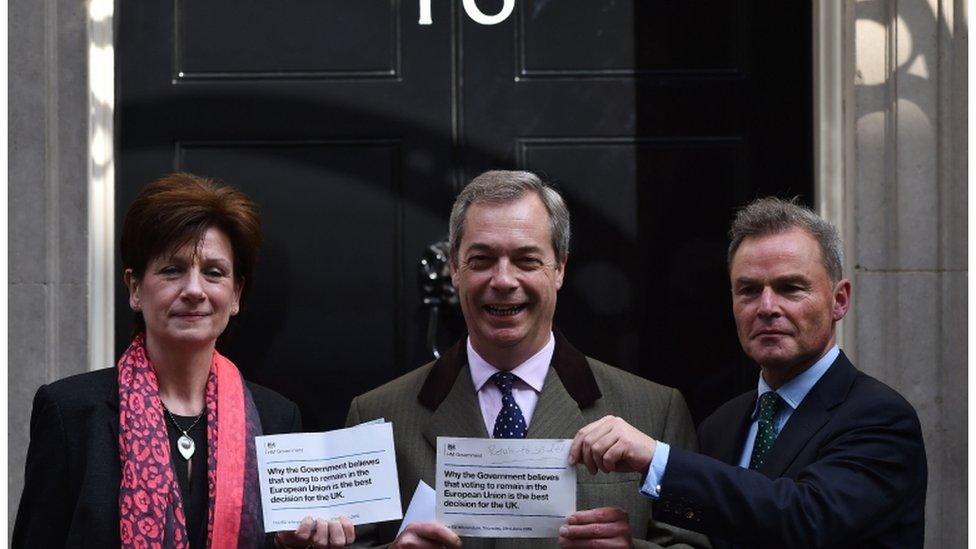
Nigel Farage has said the government's arguments are "jammed full of lies"
"Name your place and time and let's have a live, televised, head-to-head debate where we can debate one of the greatest political questions of our time," he said.
Meanwhile, Cardinal Vincent Nichols - the head of the Catholic Church in England and Wales - urged parishioners to "pray for guidance" and look beyond narrow economic concerns.
However he said he believed if the UK left the EU it would face "more complex problems than we would if we were playing an active part with Europe".
"In the EU, trade is harnessed to peace. An essential feature of the EU is the peace that has been sustained in Europe since the end of the second world war."
- Published13 April 2016
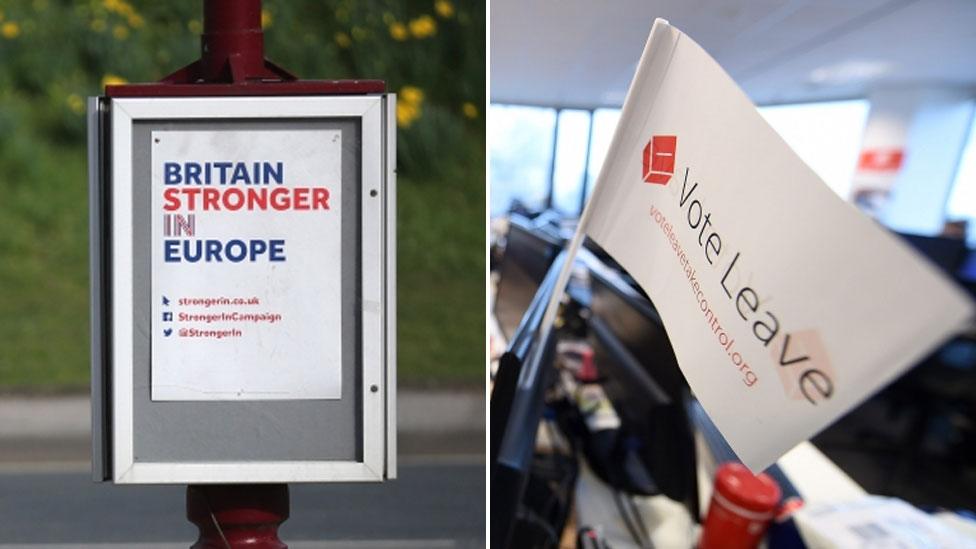
- Published1 December 2015
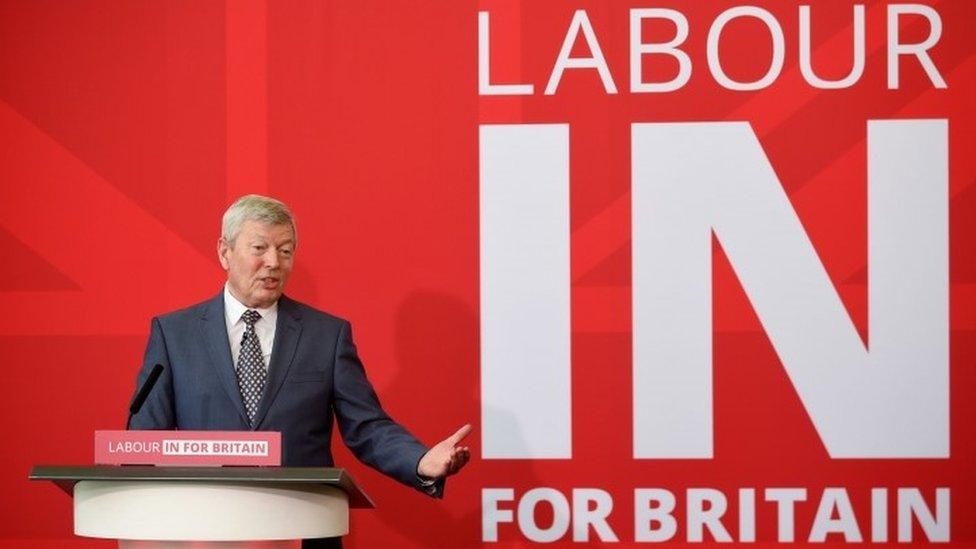
- Published13 April 2016
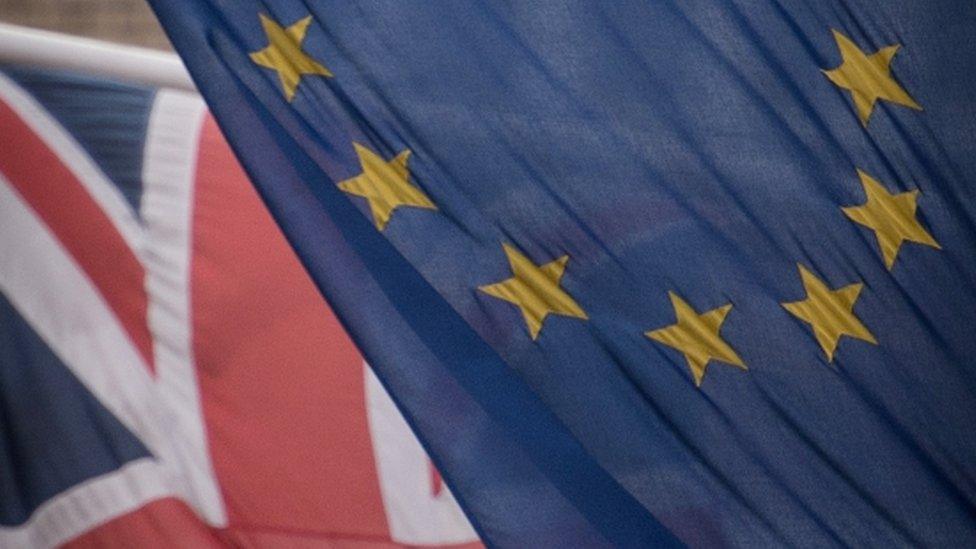
- Published30 December 2020

- Published13 April 2016
